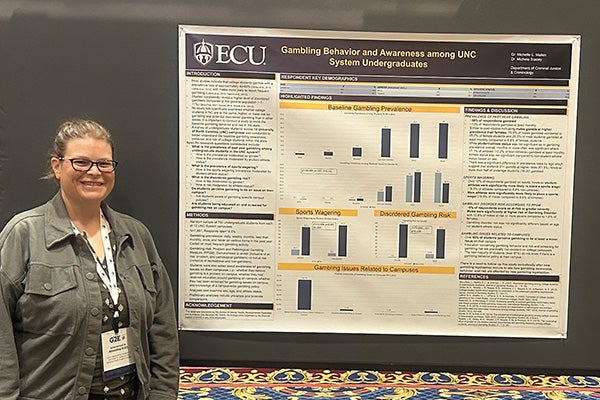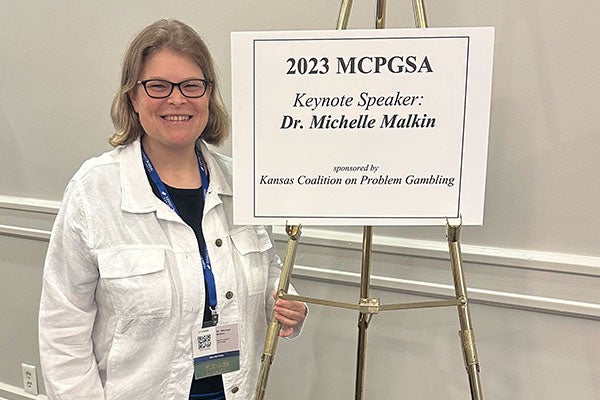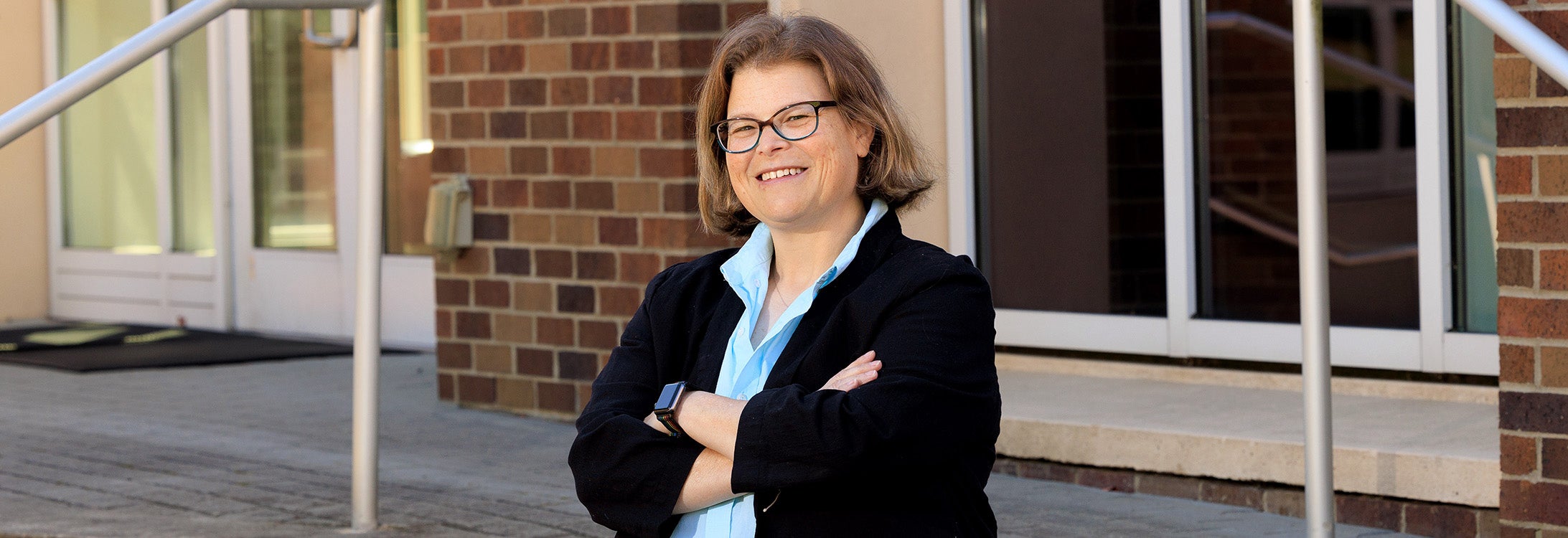GAMBLING RESEARCH
Malkin awarded funds to establish, direct new initiative
Dr. Michelle L. Malkin, East Carolina University assistant professor of criminal justice and criminology, is the director of a new Gambling Research and Policy Initiative (GRPI), which will assist in understanding gambling trends in North Carolina and throughout the United States as legalized gambling expands.
Malkin’s goal for the GRPI is to conduct research on gambling awareness, behavior, risk, gambling-related harms and gambling treatment diversion court programs, among other priorities. ECU’s Department of Criminal Justice and Criminology, housed in the Thomas Harriot College of Arts and Sciences, will run the GRPI.
“I’m beyond grateful for this opportunity to expand knowledge in the field,” Malkin said. “I never imagined I would have the resources necessary to build an interdisciplinary research team dedicated to making a difference in the gambling field and working to understand and potentially reduce the negative impacts of gambling — especially the prevalence of gambling-related harms.”
The GRPI is being funded by an initial $750,000 awarded from the North Carolina Department of Health and Human Services (DHHS) and its Division of Mental Health, Developmental Disabilities and Substance Use Services. It is anticipated that annual funding for the GRPI will continue beyond the initial award.

Malkin shared her research of North Carolina college students’ gambling behavior and awareness in a poster session at the 2023 International Center for Responsible Gaming conference in Las Vegas.
“We are honored to be working with ECU and Dr. Michelle L. Malkin — a true pioneer in the field of gambling research. ECU was the right partner for this initiative, not only because of Dr. Malkin, but because of ECU’s commitment to public health and outreach,” said Amanda Winters, problem gambling administrator for the N.C. Department of Health and Human Services.
Malkin, whose research expertise lies in the areas of gambling among marginalized communities, problem gambling, gambling-related harms and gambling-related crimes, said she looks forward to partnering with state, institutional, and industry organizations and leaders to focus resources where they are most needed and ensure policies and regulations are empirically based.
“I have worked hard to ensure that my research not only reaches academics but those that need it most,” she said “As director of the GRPI, my goal is to build a research team that is focused on understanding the impact of expanded gambling legalization on our communities, especially those that are most under-researched, so that gambling education, regulations, policies, outreach and resources can serve those most in need.”
As North Carolina and other states across the country continue to expand or consider expanding legalized gambling, Malkin said it is important to research the impact gambling has on communities, families and individuals.
Proposed legislation to add four casinos and video gaming terminals in restaurants and similar businesses in North Carolina was dropped from the recent state budget. Malkin said this will allow for more discussion over which types of gambling should be legal and at what rate expansion should occur.
“We know that sports wagering will go live in early 2024, but state regulators have not yet released all the details on its launch and restrictions. I anticipate more gambling legislation will be in consideration in 2024,” she said. “Slower expansion allows for more knowledge to be gained through research so the state can ensure enough resources are available.”
“Specifically in North Carolina, we need to conduct research to understand current gambling behavior, attitudes and risk so that expanded legalization resulting in more gambling access does not negatively impact communities and families,” she said. “Research will be able to show whether gambling prevalence and risk changes over time among different regions and demographics to help identify and target communities that need education, outreach or problem gambling services. The best programs are always well evaluated and based on empirical knowledge that can only be gained through rigorous and continued research.”
Malkin said that some of the most historically underrepresented communities requiring study include veterans, the unhoused, emerging adults and students, and lower-income and marginalized communities, which are especially prevalent on the eastern side of the state. She also said that eastern North Carolina needs research to understand why individuals with less access to legalized gambling (compared to the western side of the state, which has casinos, sports books, etc.) still have a 5.5% problem gambling rate.

In June, Malkin served as the keynote speaker at the 20th annual Midwest Conference on Problem Gambling and Substance Abuse in Kansas City. (Contributed photos)
“We know that people in N.C. are gambling on forms that are both legalized and some types that are not yet legal, which can lead to additional negative consequences,” she said. “For that reason, legal and regulated gambling is better than illegal and unregulated gambling.”
“However, that comes with the responsibility to put funds into education, outreach, problem gambling services and research,” Malkin said. “Access to gambling-certified mental health providers, in- and outpatient services, and recovery meetings are scant in eastern N.C. compared to other parts of the state. The research will help DHHS and others at the state identify where to focus on building more infrastructure for these types of programs.”
Research projects at the GRPI will include understanding gambling prevalence and risk among LGBTQ+ individuals, a baseline study of college students gambling across the UNC system, a national study of the relationship between gambling-type legality and voluntary self-exclusion opportunities, and gambling treatment diversion court implementation and strategies. Work is also underway to create an initial five-year plan for semi-regular N.C. gambling prevalence studies.
Initial work is underway to establish the GRPI office in the A wing of ECU’s Brewster Building and hire an administrative assistant and full-time research positions, including an assistant director, a research associate, and graduate and undergraduate research assistants. Websites for the GRPI and a separate national voluntary self-exclusion repository are being developed.
“This initiative will allow the state to monitor trends and develop resources to create meaningful changes for people whose lives have been impacted by gambling,” said Winters. “The impact this initiative will have on the national, state and local level is unmeasurable.”
